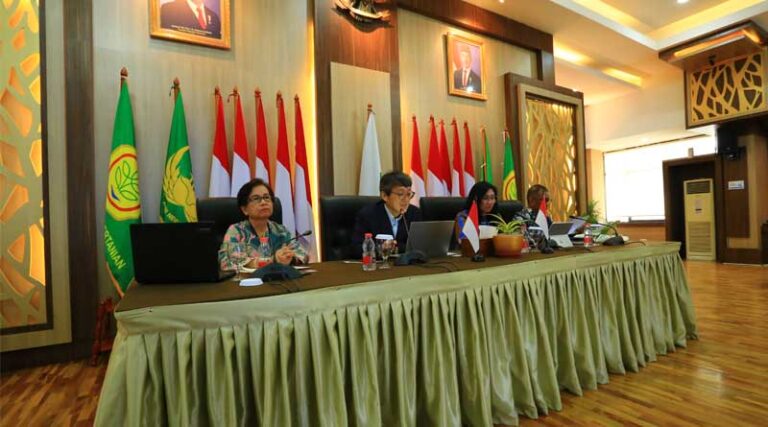
Transitioning LKP2.0: Towards Strengthening IRRI and Indonesia’s Partnership And Digitalizing Indonesia’s Agriculture
24 October 2025, Jakarta: The International Rice Research Institute (IRRI) and the Indonesian Ministry of Agriculture transitions Layanan Konsultasi Padi 2.0 (LKP2.0), marking a significant step towards digitally transforming the country’s agriculture sector.
Under the Rice Crop Manager (RCM) Indonesia Project (2022-2025), funded by the Ministry of Agriculture, Food and Rural Affairs (MAFRA) of the Republic of Korea, IRRI and Indonesia’s Badan Perakitan dan Modernisasi Pertanian (BRMP) [Agency for Agricultural Assembly and Modernization] have developed and disseminated LKP, a localized web- and mobile-based advisory tool which aims to support Indonesia’s goals for rural prosperity, food security, environmental sustainability by providing site-specific fertilizer recommendations for rice farmers.
The RCM Indonesia Project aimed to expand digital advisory services to help farmers increase yields, reduce input costs, and promote sustainable farming practices. It marks a decisive step toward integrating science-based, climate-smart technologies into national agricultural programs. In its three-year run, LKP 2.0 has generated over 125,000 field-specific fertilizer recommendations across eight provinces. The tool helps farmers apply the right type and amount of fertilizer at the right time.
“The RCM Indonesia Project has shown how digital innovations can empower farmers to make data-driven decisions for improved productivity and sustainability,” said Dr. Jongsoo Shin, IRRI Regional Director for Asia. “Indonesia is taking bold steps to integrate tools like LKP into national programs, setting an example for sustainable rice production in Asia.”
BRMP Executive Secretary Dr. Husnain reaffirmed the Ministry of Agriculture’s long-standing partnership with IRRI, which spans more than five decades. “With tools like LKP 2.0, we are ready to scale up technology adoption that supports Indonesia’s targets for rice self-sufficiency and farmers’ welfare,” he said.
As Indonesia continues its digital agriculture journey, IRRI and BRMP are exploring new opportunities for collaboration. This partnership directly contributes to IRRI’s 2025-2030 Strategy, which aims to accelerate the transition to resilient, inclusive, and sustainable rice-based agri-food systems. By embedding digital tools like LKP into national programs, Indonesia and IRRI are helping create an enabling environment where science, technology, and policy converge to deliver real benefits for farmers and the planet.
IRRI Senior Scientist and RCM Indonesia Project Leader, Dr. Madonna Casimero shared that farmers using LKP achieved an average yield increase of 0.6 t ha⁻¹ and income gains of USD140 per hectare every season, while applying 28 kg N ha⁻¹ less fertilizer, roughly one bag of urea. “The results show that digital solutions like LKP can transform how fertilizer is managed at scale,” said Dr. Casimero. “What’s most encouraging is how quickly our partners and farmers have embraced this innovation.”
The project concluded with a two-day completion workshop in Jakarta, celebrating key achievements and mapping the next steps for national integration of LKP into government programs. The sessions featured a mini Innovation and Scaling Readiness (IPSR) workshop, where participants from BRMP, the Directorate of Fertilizer, the Center for Agricultural Extension, and IRRI reflected on the future scaling of LKP. In breakout sessions, they shared their vision for scaling, identified anticipated challenges such as farmer behavior change and institutional coordination, and proposed solutions including integration with the Cyber Extension platform, stronger policy alignment, and continued capacity building through demonstration plots.
The workshop also brought together partners from the Directorate of Fertilizer and the Center for Agricultural Extension (PUSLUHTAN), highlighting government leadership in aligning digital tools with national policy and extension systems. “The LKP is excellent for providing accurate fertilizer recommendations for rice farmers,” shared Ms. Anis Minarwati from the Directorate of Fertilizer. “Using the correct and balanced fertilizer dosage leads to more efficient fertilizer use and can also serve as basis for determining the allocation of subsidized fertilizers in the following year.”
The Directorate noted that about 53% of the Definitive Group Needs Plan (RDKK) has been covered this year, with 9.5 million metric tons of subsidized fertilizer allocated under a 44 trillion IDR budget. “Given the scale of this investment, technologies like LKP are essential to ensure that resources are used efficiently and reach the farmers who need them most,” Ms. Anis Minarwati added.
PUSLUHTAN highlighted the importance of capacity building and institutional support. “Digital tools like LKP can only succeed when extension workers are fully equipped to use them,” said Prof. Dedi Nursyamsi from PUSLUHTAN. “We plan to integrate LKP training into the national Cyber Extension platform to reach more farmers across provinces.”
BRMP’s presentation illustrated the project’s results, showing improved nutrient efficiency and strong farmer feedback from pilot provinces.
BRMP Food Crops Director Dr. Haris Syahbuddin called for continued cooperation and focus on scaling. “We must keep expanding the use of LKP 2.0, work closely with policymakers to embed it into the fertilizer subsidy program, and pursue further research in swampy and rainfed areas,” he said. “These are our shared commitments moving forward.”
📢 If You’re in Agriculture, Make Sure the Right People Hear Your Story.
From product launches to strategic announcements, Global Agriculture offers unmatched visibility across international agri-business markets. Connect with us at pr@global-agriculture.com to explore editorial and advertising opportunities that reach the right audience, worldwide.






